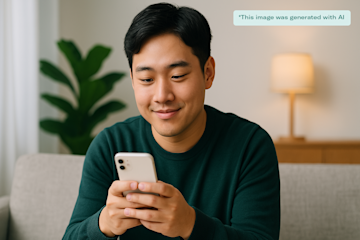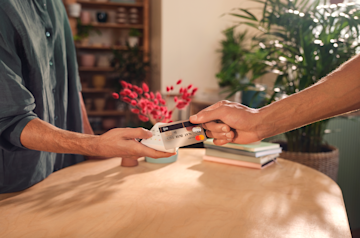
How to build a healthy relationship with your bank account
Stuck in a rut with your finances? Here’s how to overcome financial anxiety and create a healthy, sustainable relationship with your money.
6 min read
It might sound strange, but the relationship you have with your bank account can be one of the most important relationships in your life. If just thinking about checking your bank balance fills you with dread, though, you’re not alone. Building a healthy relationship with your finances takes time and practice, and often the first steps are the most challenging ones. However, moving toward a healthier relationship with your money can be incredibly empowering — and can positively impact other areas of your life. Here’s how to start building (or rebuilding!) a healthy and sustainable relationship with your bank account.Financial anxiety is a well-researched phenomenon — and it’s very real. It affects people of all ages from all over the world and comes in many different shapes and forms. At its core, anxiety occurs when the mind and body perceive a frequent external stressor and the nervous system goes into overdrive. While this fight or flight state is useful when escaping the jaws of a hungry lion, it’s not as practical when it comes to dealing with our finances. If we reach a point of chronic financial anxiety, that’s because our nervous systems are accustomed to feeling stressed when we think about money. This cycle can seriously impact our emotional and physical health, mood regulation, sleep, and even digestion and the immune system. Financial anxiety can present itself in a variety of different behaviors. These include:To start building a better relationship with your bank account, it’s important to understand the root cause of your financial anxiety. The causes are often the result of negative early childhood experiences, big life changes such as losing a job or having a child, or low self-worth and shame. No matter what’s underpinning your financial anxiety, the first step to tackling it is to understand where it comes from. Having this knowledge can bring you some extra clarity, which can then help you better calm your nervous system when financial anxiety starts to set in.
Once you’ve got a better understanding of where your financial anxiety comes from, you can start taking practical steps to improve your relationship with your money. Here’s where to start:Self-awareness is key to improving your relationship with money. This means getting a better picture of your financial behavior and habits and understanding what drives you to take certain actions. If you don’t know where to start, ask yourself some of the following questions:
When it comes to making lasting, sustainable changes in behavior, the key is to start small — really small. For example, if the idea of looking at your bank balance brings on an anxiety attack, practice simply entering your login details on your banking app before closing it again. From here, you can slowly get used to keeping the app open for a few seconds each day until you can look at your balance for ten seconds or more. Next, you might start experimenting by looking at a few of your outgoing or incoming payments. Keep going like this and, step by step, you’ll get a better picture of your current financial health. Starting to face your fears is often the most difficult part. During this phase, the most important thing is to keep repeating small positive behaviors regularly. Don’t try to do too much too soon, as it’s important that your new financial habits are sustainable.Once you’ve created a few good financial habits and you’re getting a better picture of your finances, you can introduce the idea of creating a basic budget. A simple budget helps you get a solid understanding of how much money you have coming in and out of your account each month. With this knowledge, you can then work toward paying off any outstanding debts, or save for an emergency fund that can be your financial safety net.To start, go through at least three months of your recent bank statements and group your expenditures into two categories: With a solid budget in place and more clarity about your finances, the next thing you should focus on is paying off any outstanding debts. Not only can it be empowering and freeing to become debt-free, but it also prevents you from racking up more debt over time thanks to compound interest. The debt snowball and avalanche methods are two useful, practical approaches to paying off your debts.Once you’re debt-free, another great way to reduce financial anxiety is to start saving for an emergency fund. Essentially, this is a financial buffer between you and any costly emergencies such as sudden job loss, illness, accidents, or the death of a loved one. This means that your future self is prepared for the worst. But on top of that, an emergency fund can also be an effective remedy against any financial anxiety, because you’re no longer living paycheck to paycheck.
At N26, enjoy a simplified, stress-free way of managing your money. Stay up-to-date with your finances, thanks to instant push notifications each time money enters or leaves your account. Plus, gain a deep understanding of your spending habits with Insights and get a monthly snapshot of your financial health with your Monthly Wrap-Up. Find the right account for you.
Understanding financial anxiety
How financial anxiety affects behavior
- Overspending – It might sound counterintuitive, but people suffering from financial anxiety can gain some temporary relief from their stress with the brief high of “retail therapy.” Unfortunately, this does little to improve the state of their financial health and can actually kickstart a vicious cycle.
- Avoidance – Many cope with their financial anxiety by avoiding their finances altogether. This can look like a reluctance to check bank balances, open bills, or talk about money.
- Underspending – Sometimes financial anxiety shows up as a fear of spending. This results in obsessive saving and avoiding any spending — to an extreme.
Find the source of your anxiety
Practical steps to improve your relationship with money
Understand your financial behavior
- When do you tend to spend the most money?
- How do you feel when you spend money?
- When are you more likely to save money?
- When you think about your finances, what emotions come up?
- Which area of your finances gives you the most anxiety (i.e. overspending, checking your account, opening bills, etc.)
- What are some of your most negative and positive experiences with money?
Start small
Create a basic budget
- Fixed costs – all of your essential costs, like rent, utility bills, and debt repayments
- Variable costs – all of your non-essential costs such as subscriptions, shopping, entertainment, and eating out
Focus on becoming debt-free
Create a financial safety net
Your money at N26
Find similar stories
BY N26Love your bank
Advertising message for promotional purposes. Please see the contractual documentation for more information in the Legal Documents Section.
Related Post
These might also interest youLIFESTYLECould AI help you manage your money?86% of people are open to using AI for financial planning, but is it safe? Learn how AI is already transforming money management, and discover the pros and cons.
4 min read
LIFESTYLEUnderstanding tariffsFrom higher grocery bills, pricier electronics, and stock market swings, tariffs can impact your wallet and your investments.
5 min read
LIFESTYLEDe-hyping the no-spend challengeThis extreme challenge promises to transform your finances, but is it really the game-changer it claims to be?
4 min read


